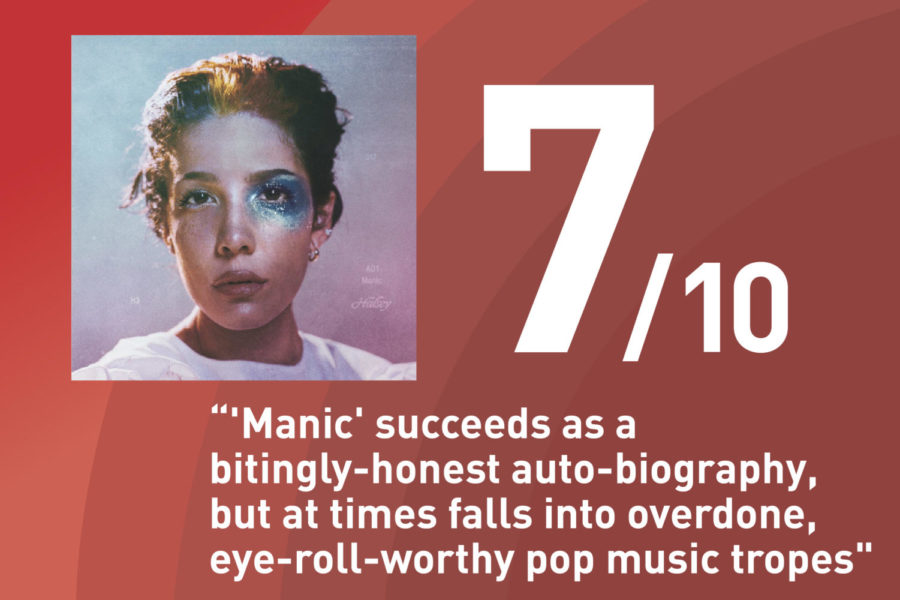Halsey explores her artist persona on “Manic”
January 26, 2020
After three years since her last studio album release, Halsey returns to the spotlight with “Manic,” showcasing her poignant lyrical ability through some of her most vulnerable tracks to date.
“When I made ‘Manic,’ I dove into those parts of me that weren’t healed yet and I said, ‘No, I’m not gonna wait ’til later,” Halsey said from a stage at Capitol Records, according to a Billboard article. “I’m gonna write about them right now.'”
The 16 track album comes to just under 48 minutes long, with six singles being released before its full release, featuring “Without Me,” which ended up being the lead single.
The extensive tracklist contains tracks that blend into each other masterfully. In a tweet, Halsey said the album was meant to be listened to in order, as the placing of each song is specific regarding the surrounding tracks.
The biggest thing this album symbolizes is growth. “Manic” is Halsey’s third studio album. Her first album, “Badlands,” addressed similar taboo topics as her latest releases, but through rose-colored glasses and with more than a dash of pretentiousness.
Her second album felt like a stage performance, set with a more distinctive and purposeful theme, in “Hopeless Fountain Kingdom.” While the concept album was an interesting notion, it lacked the artist-audience connection felt earlier in her career.
“Manic” brings that personal connection back with a vengeance, and Halsey’s lyrics deliver a sense of nostalgia to her earlier music, but this time around with a more mature sound.
The opening track is a namesake of the artist herself. “Ashley,” named after Halsey’s real birth name, Ashley Nicolette Frangipane, sets the personal tone for the record. From the beginning, Halsey strips down everything, including her stage name. She has a screaming match with herself as the track goes on, fighting between her personal self and her stage persona.
The song opens with a theme of desperation and fighting failure, which continues throughout the following 15 tracks. “And I don’t wanna be somebody in America/ Just fighting the hysteria/ I only want to die some days,” she sings.
While “Manic” does focus on the difficult themes of her depression and loneliness in a somber way, other tracks such as “You Should be Sad” and “Killing Boys” use those same emotions centered around self-worth, anger and revenge.
“No, you’re not half the man you think that you are/ And you can’t fill the hole inside of you with money, drugs, and cars/ I’m so glad I never ever had a baby with you/ ‘Cause you can’t love nothing unless there’s something in it for you,” she sings on “You Should be Sad.”
There are three interludes on the album, and this is where “Manic” apparently becomes disjointed. One or two of these short tracks would have been enough, but three is overkill and they each stick out drastically from the other tracks and not in a good way.
The three interludes are a lackluster attempt at filling airspace with useless features, with SUGA from BTS, singer and rapper Dominic Fike and Canadian-American singer Alanis Morissette. Morissette’s track, “Alanis’ Interlude,” is easily the weakest of the tracks, with oddly vulgar and mumbled lyrics for shock value carrying the song.
The journey and self-discovery of theme on “Manic” feels interrupted by the features, rather than adding anything valuable. They are ultimately forgettable, which is a shame when the rest of the album leaves such an impact.
While the features from other artists seem forced and pointless, the samples from film on the album add a sense of cinematic drama and are not overused. Their placements and snippets seem purposeful, using popular movie soundbites from films “Eternal Sunshine of the Spotless Mind” and “Jennifer’s Body.”
Closer track “929” feels like a diary entry you shouldn’t be reading, with raw and emotionally heavy lyrics that stopped me in my tracks when I first heard the song. It showcases her journey through her 25 years of life.
Halsey’s voice cracks as she rambles in a stream-of-consciousness, spoken-word style. “And it’s just these things that I’m thinkin’ for hours/ And I’m pickin’ my hair out in clumps in the shower/ Lost the love of my life to an ivory power/ But then I realize that I’m no higher power.”
Halsey said “929” is the most open she has ever been on a track, and based on the transparency of her past songs, that says a lot.
“Manic” succeeds as a bitingly-honest auto-biography, but at times falls into overdone, eye-roll-worthy pop music tropes. Nonetheless, the album makes you feel a little less alone, as Halsey tackles challenging topics with grace, honesty and compassion.
Final Verdict: 7/10







